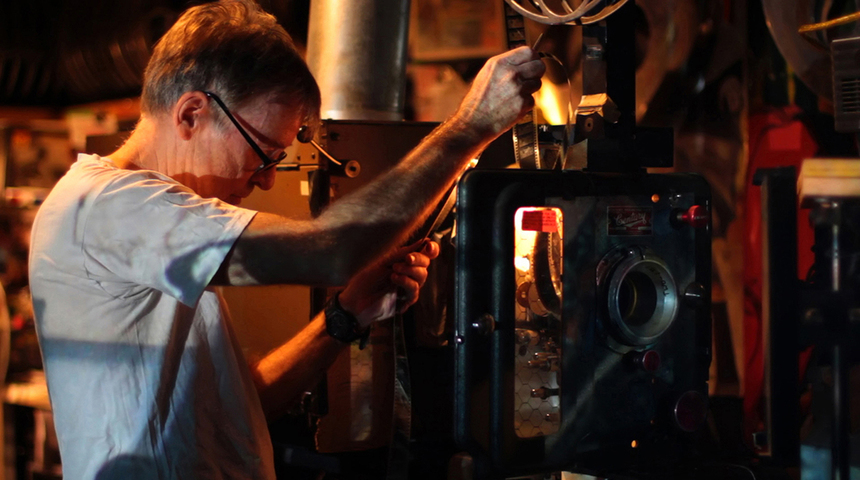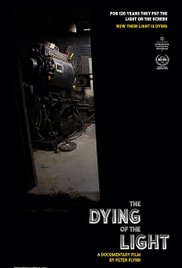Review: THE DYING OF THE LIGHT Fittingly Eulogizes Film Projection

The documentary The Dying of the Light might not be what one expects.
A chronicle of the radically shifting technology of film exhibition, the only death in the movie is of course the death of a beloved, established way of showing movies. Yet, the death is real, the end of an era where the mystery of the photo-chemical process collided with the clicking mechanisms and cantankerous carbon arcs of complex projector units to result in what has most certainly been "a living thing."
More real then, is the death of the many, many professions that enabled it all.
As the sun was setting on celluloid as the preeminent method of shooting and exhibiting motion pictures, cinema purists were quick to mourn the format. The term "film buff" took on a more literal significance than it ever previously had. For over 100 years, since the inception of the movies themselves, the photo-chemical process was the basis by which it was all possible.
Around 2012, the major studios began to announce their disassociation with the technology, as digital filmmaking had by then fully emerged, in their eyes, as a viable and far more cost effective replacement. This was the final nail in celluloid's long developing coffin. Eulogies abounded, and those concerned with historical film preservation got justifiably panicky. After all, when the last film manufacturer standing is forced to close, there goes the only proven method of archiving cinema's already fragile history.
To date, this movie-lovers apocalypse has been narrowly averted. The struggle, however, continues. Film itself, for the foreseeable future, will keep being made available. Just don't count on seeing it projected far and wide. (Quentin Tarantino's recent grand scale 70mm resurrection attempt, The Hateful Eight is covered here. In the continuing spirit of unavoidable death and dying, it is noted as a box office failure.)

Which brings us to the true focus of this latest documentary to cover "the death of film." Director Peter Flynn wisely shifts his gaze away from the well-lamented aesthetic and archival issues, and to the oft-overlooked unsung heroes of moviegoing: The projectionists.
Mostly grizzled older men, and the occasional woman, these are the people who've spent their professional lives alone in dark booths physically putting on the show. As in, putting the large spools of film onto the platters and making sure the sprocket holes are aligning at 24 frames per second. They are the ones who've done all the vital, invisible work we viewers have taken for granted: Maintaining focus, pulling off seamless reel changes, keeping the rickety projectors flickering by any means necessary.
Nowadays, the theaters use touch screens. The weighty platters of unwieldy celluloid are buried in the past; the movies exist exclusively on hard drives. Flynn's film gets to the heart of this imposed technological change that's altered yet another profession from a revered hands-on trade to just another I.T. job. The old guys detail what it's like to be put out to pasture… or not. Some have made the jump. Others, knowing full well that their fingers would would only figuratively get stuck in the figurative keys of the computer, have bowed out. An imposed retirement.
Primarily through talking head interviews in a handful of American cities and small towns, The Dying of the Light functions not only as a history lesson of projection, but shines as a eulogy to the profession that made it possible. Perhaps ironically, Flynn's digitally-realized doc has a workaday crispness about it. The immediate visual impression it makes is “PBS ready” (Public Broadcasting Service).
That said, it demonstrates an expected cinematic flare wherever possible: Lingering just long enough on well framed shots of unearthed, long-abandoned projection booths, framing up the many crumbing movie palaces that are explored as acts of urban archeology. On the whole, it's a necessary and valiant work, if not a piece with the kind of cinema it's lamenting.
It's worth noting that director Paul Schrader, of American Gigolo and Hardcore fame, attempted to transpose his well-established seedy aesthetic onto the “death of film” topic with his 2013 Lindsey Lohan trashfest The Canyons. In between scenes of porn actors scheming to make skin flicks with their iPhones, Schrader intercuts still images of dilapidated cinemas of yore.
As Peter Flynn and his crew shine their camera-mounted panel lights on these same places one after another, the reminder of the similar evocations in Schrader's movie can't be helped. All the more synchronous then, is the fact that Schrader's very next feature is also called Dying of the Light. It stars Nicolas Cage as a C.I.A. agent on the trail of a terrorist. Having not seen that Dying of the Light, this critic can only imagine a final showdown in the once-great movie palace, The Michigan Theater, now the world's most ornate parking garage. (As seen in Jim Jarmusch's Only Lovers Left Alive, and covered in Flynn's The Dying of the Light.) In any case, when queuing either movie, this is something to double check.
Flynn's The Dying of the Light will leave viewers with a proper and palpable sense of loss, regardless of anyone's level of movie fandom, be it full-blown film buff or casual viewer. It is a fitting remembrance of both of the enigmatic allure of imperfect celluloid, and of the valued careers of so many skilled secret show-people, the “men behind the curtain.”
In seeing their own worn, scratched and faded nature, and hearing their stories, we understand how man has been part of this particular machine the entire time. No one can deny the value of a digital cinema image that is perfect every time, but who can spiritually relate to such engineered perfection? At the end of the day, the litany of their crumbing theaer carcasses is merely the metaphor for the piece of us that is being mothballed, one cinemaplex, drive-in, and art house theater at a time. This is the light of truth that Peter Flynn shines.
The Dying of the Light will play theatrically as part of the Webster University Film Series in St. Louis, Missouri this weekend, June 3 through June 7. More details are here.







